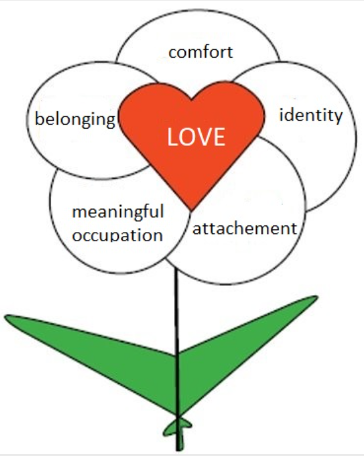Basic needs
Being human. Showing interest. Sensing someone’s needs. Having the freedom to decide when to sleep. Taking walks. Having enough food. Feeling integrated into society. Kindness. Being free from pain. Doing household chores together.

These are just a few responses from individuals with dementia when asked, ‘What brings you happiness? What defines good care?’ Each person with dementia is unique, so the question ‘What is good care?’ results in diverse answers for each individual. As a (future) informal caregiver, your goal is personalized care—tailored to the person with dementia. It’s not about routine care, but about perpetually seeking what is meaningful for that individual at that particular moment.
Tom Kitwood researched the needs of people with dementia and identified five fundamental psychological needs. While these needs are universal, their fulfillment becomes less apparent due to dementia, making them all the more vital. Kitwood visualizes these needs as a flower, where the petals overlap, symbolizing their close interconnection and mutual influence. The heart at the centre of the flower bud signifies the connection between these needs, similar to how love unites individuals uniquely and personally.
The five psychological needs are comfort, identity, attachment, meaningful occupation and belonging.
Feel physically, materially and psychologically comfortable. As a caregiver, you respond to a person’s emotions. You ensure that the person with dementia feels secure and safe with you.
With dementia, the sense of identity slowly disappears. Important memories disappear. The person with dementia becomes increasingly dependent on you, as the caregiver, and on his family to keep his personal story alive. Help the person with dementia hold on to his identity, for example, by recalling memories of the past and by adopting habits and rituals.
Being connected, being cherished, having a trusting relationship with caregivers. Feeling accepted as a person. As cognitive problems increase and make people feel insecure, the need for warm, cordial contact with you as a caregiver grows.
A person with dementia also needs to be involved in their environment in an active and personally meaningful way. To be addressed on his talents, interests and possibilities. So give the person with dementia opportunities and take a good look at who he is as a person.
Human beings are inherently social creatures, and the need for belonging is fundamental. In the context of dementia, this need becomes more pronounced. However, as contact with family and friends diminishes, many unfamiliar faces enter the picture. This influx of new and unfamiliar individuals can be disorienting or even threatening.
